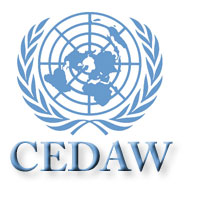
Editor’s note: Throughout the fall, VQR will be posting educational information related to women’s rights, to extend and support the articles in our Fall 2012 issue on The Female Conscience.
———
Adopted by the United Nations in 1979, the Convention to End Discrimination against Women (CEDAW) makes two basic statements:
- Women are inherently equal to men
- A nation’s laws should reflect that equality
The actual treaty is a bit longer than that, but it’s relatively brief and straightforward. It signifies a nation’s commitment to legally guarantee a woman’s equal rights in education, family, politics, employment, and society as a whole.
So why haven’t you heard of it? Most likely because the United States has not ratified it. Even though the U.S. had a hand in drafting the treaty, it remains one of only six UN members abstaining from ratification. To put this in perspective, 187 nations have ratified it; Iran, Somalia, Sudan, Tonga, Palau—and the United States—have not.
But wait, you say; many UN member nations have atrocious women’s rights records.
Yes. Yes, they do.
CEDAW can be ratified with reservations, meaning that nations may specify ways in which they plan to ignore it. In fact, recent attempts to ratify the treaty in the U.S. would have attached several reservations, such as one striking the commitment to equal pay for women.
In addition, there are no penalties for failing to implement CEDAW’s provisions. A committee reviews and comments on progress reports made by each ratifying nation, then makes suggestions for improvement.
Nonetheless, CEDAW remains the international gold standard for establishing and promoting women’s rights. CEDAW allows monitoring of and commentary on rights violations—you can’t encourage progress without setting a bar. Several nations have used CEDAW as a guide in reform, and women’s rights activists in the U.S. hope for unreserved ratification of CEDAW in the near future.
Further reading
• The comprehensive UN site for CEDAW includes progress reports by country (under Sessions).
• The National Organization for Women (NOW) offers more information on U.S. ratification of CEDAW
———
About the author: Nicole Klungle is a freelance writer and editor who lives in Cincinnati, Ohio.






